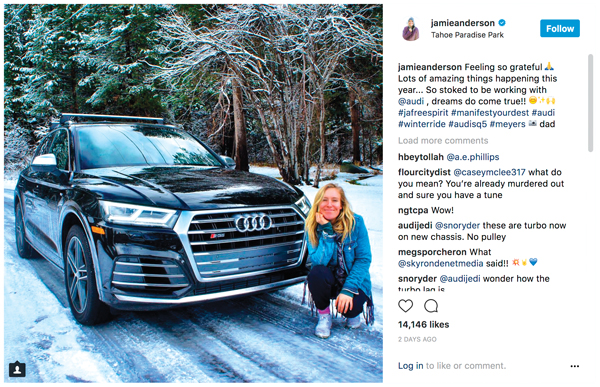Audi has signed 2014 Sochi gold-medal snowboarder Jamie Anderson to an endorsement deal, landing a blow against competitor Toyota’s aggressive entry into the Olympic world this year.
Last December, Toyota obtained exclusive rights in the auto category with the U.S. Ski & Snowboard, which includes access to athletes and title sponsor rights to the U.S. Grand Prix Olympic qualifying tour. Toyota is also a global Olympic sponsor.
Normally, Anderson would be prohibited from signing a personal contract with a Toyota competitor as a condition of joining the official U.S. national team, which she did this year after remaining independent during the 2014 Olympic cycle — as snowboarders Shaun White and Danny Davis routinely do.
But as the Toyota deal was coming together, her agents at Stanton & Co. discussed an exception with U.S. Ski & Snowboard CEO Tiger Shaw. The Audi deal became public when Anderson posted an image of a car Audi gave her on her Instagram account Nov. 27.
Without the national team or Olympic rights, Audi can’t promote Anderson in her national team gear or identify her as an Olympian. She also will not be allowed to place Audi stickers on her snowboard at any Grand Prix events.
 |
Audi’s deal with snowboarder Jamie Anderson counters Toyota’s official standing as a global Olympic partner.
|
But there still could be a meaningful halo effect for Audi — Anderson is among the half-dozen or so most prominent Americans expected in Pyeongchang, and likely will be a key point of emphasis for NBC coverage. She also will be free to promote her Audi ties at the X Games, the Dew Tour or other independent events.
In one sense, the situation is not that unusual. Federal law guarantees individual athletes control over their commercial rights, and other sports have seen conflicts arise when they seek to compel cooperation with a team-level deal. In 2015, U.S. track athlete Nick Symmonds unsuccessfully sued USA Track & Field over a requirement that he spurn his personal sponsor, Brooks Running, at an event where Nike provided team uniforms.
But the Anderson deal is notable because it comes as USS is overhauling its commercial division in hopes of better aligning its marketing interests with athletes’ interests. In fact, after the Toyota deal was signed and Anderson secured approval to go with Audi, the national governing body hired new Chief Commercial Officer Dan Barnett to pursue that goal.
“Our strategic vision for the future is for our athletes and U.S. Ski & Snowboard to collaborate together on commercial partnerships, to leverage and maximize the huge commercial value for all involved,” Barnett said in a prepared statement. He added that Toyota still has full access to all of its events, teams and athletes.
But the Anderson situation illustrates the challenges they face in trying to persuade all athletes to stick with the team.
A team-level relationship with Toyota expands the number of personal endorsement deals available to the overall field of American snowboarders and skiers, but the most marketable stars, like Anderson, often can find more lucrative deals on their own.
Furthermore, snowboarding in general offers its athletes less of a reason to sign with the team than alpine skiing, for instance, where the only professional-level circuit, the FIS World Cup, requires athletes to compete as part of a national team in uniforms. (Notably, Audi remains a sponsor of the FIS World Cup, even though Toyota now has the rights to the U.S. team.)
Snowboarders do not compete in a team uniform outside of the Olympics, and have more moneymaking opportunities flowing from independent events such as the Dew Tour.
Snowboarders were free to sign car deals for several years because Audi’s rights extended only to the ski team. Fellow Sochi gold medalist Maddie Bowman signed with Subaru in 2014, a deal that was grandfathered in when Toyota came along. Anderson’s Audi deal developed after Toyota came on.
Audi confirmed its relationship with Anderson but otherwise declined comment. Stanton & Co. also declined to comment. Toyota could not be reached.




